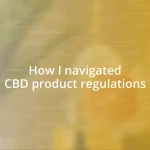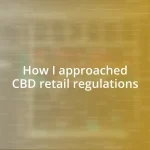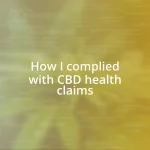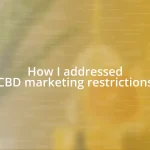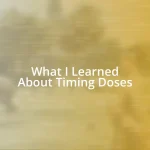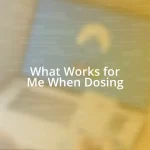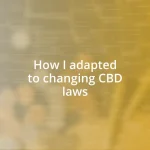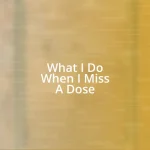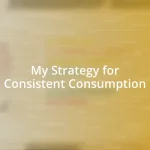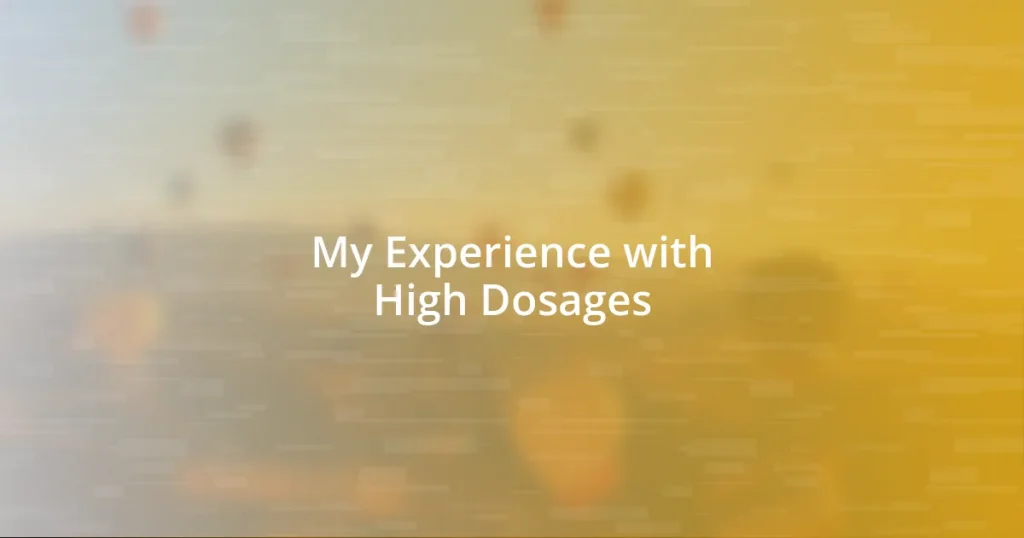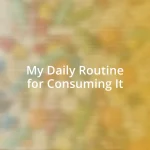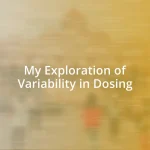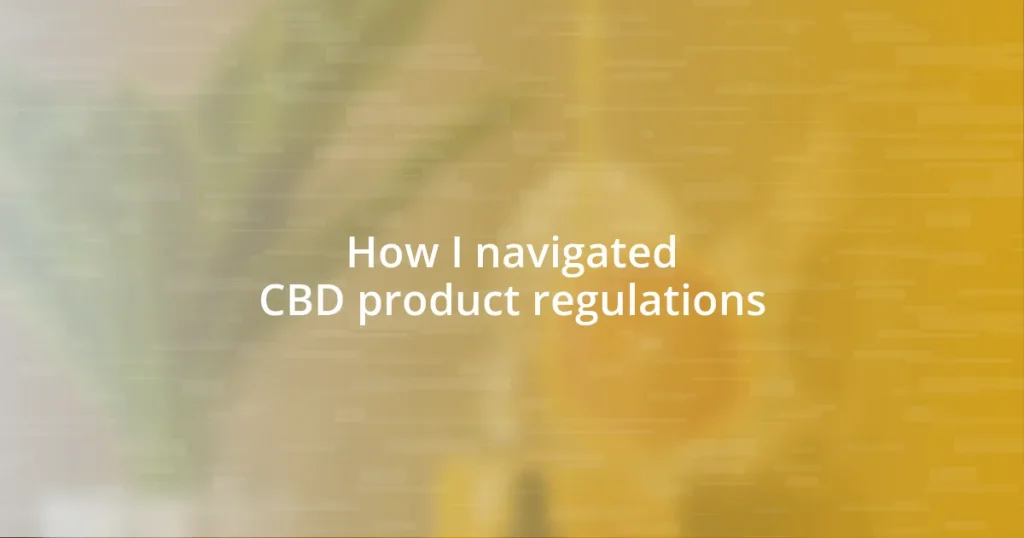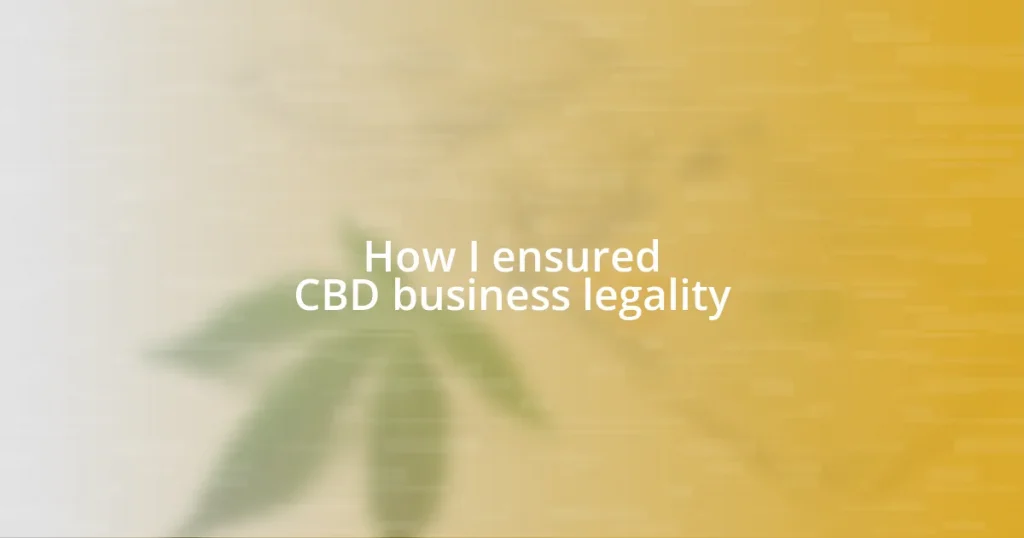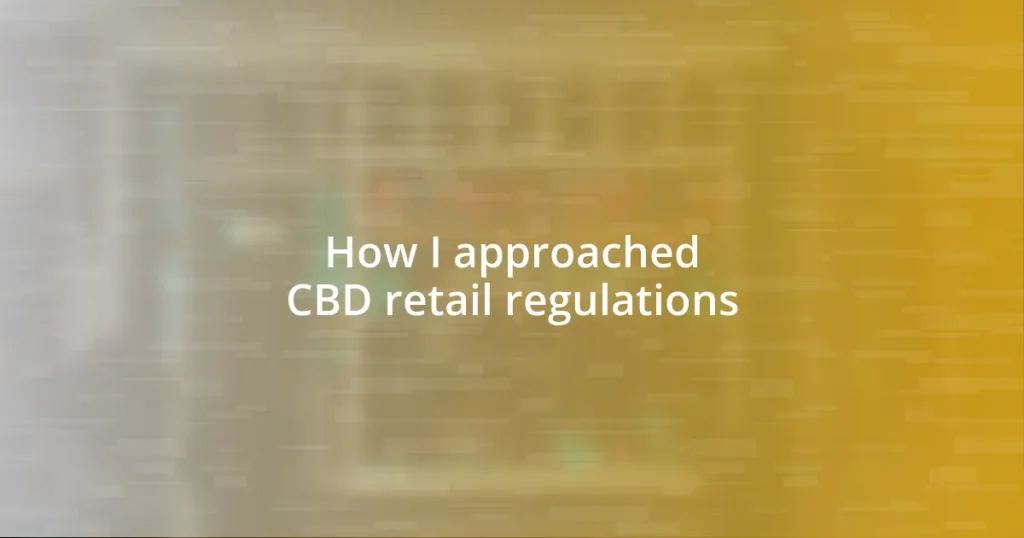Key takeaways:
- High dosages can lead to both euphoria and vulnerability, highlighting the need for self-awareness and understanding one’s limits.
- Prolonged use can result in emotional numbing, physical fatigue, and cognitive drift, emphasizing the importance of moderation.
- Implementing practices such as journaling and utilizing support systems can effectively manage side effects and ensure safer dosage increases.
- Learning from peers’ experiences and sharing coping strategies can provide valuable insights and foster a sense of community in navigating challenges.
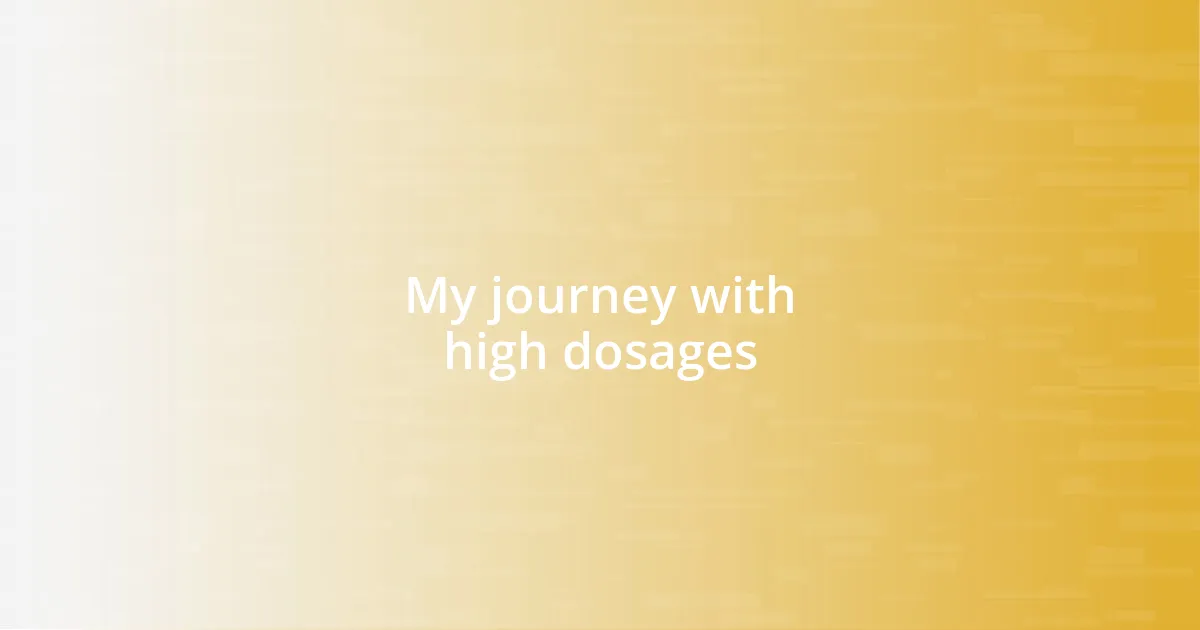
My journey with high dosages
I remember the first time I experimented with high dosages; it felt like stepping into an uncharted territory. The initial rush was exhilarating, but soon I found myself grappling with mixed emotions—both a sense of empowerment and an unsettling vulnerability. How was it possible that something meant to augment my experience could also make me feel so fragile?
As I navigated this journey, I encountered moments that reshaped my understanding of balance. One day, I took a higher dose than usual, thinking it would enhance a particular experience. Instead, I found myself lost in a whirlwind of thoughts and sensations, struggling to ground myself. Have you ever had a moment where your expectations collided with a reality you weren’t prepared for? That day taught me the importance of knowing my limits and listening to my body.
Looking back, high dosages were a teacher in disguise. They opened my eyes to both the euphoria and the pitfalls of pushing boundaries. Each experience left its mark, layering my consciousness with knowledge and insight. It begs the question: Are we truly in control, or are we merely explorers of our own thresholds? This journey has certainly made me ponder my relationship with substance and self-discovery deeply.
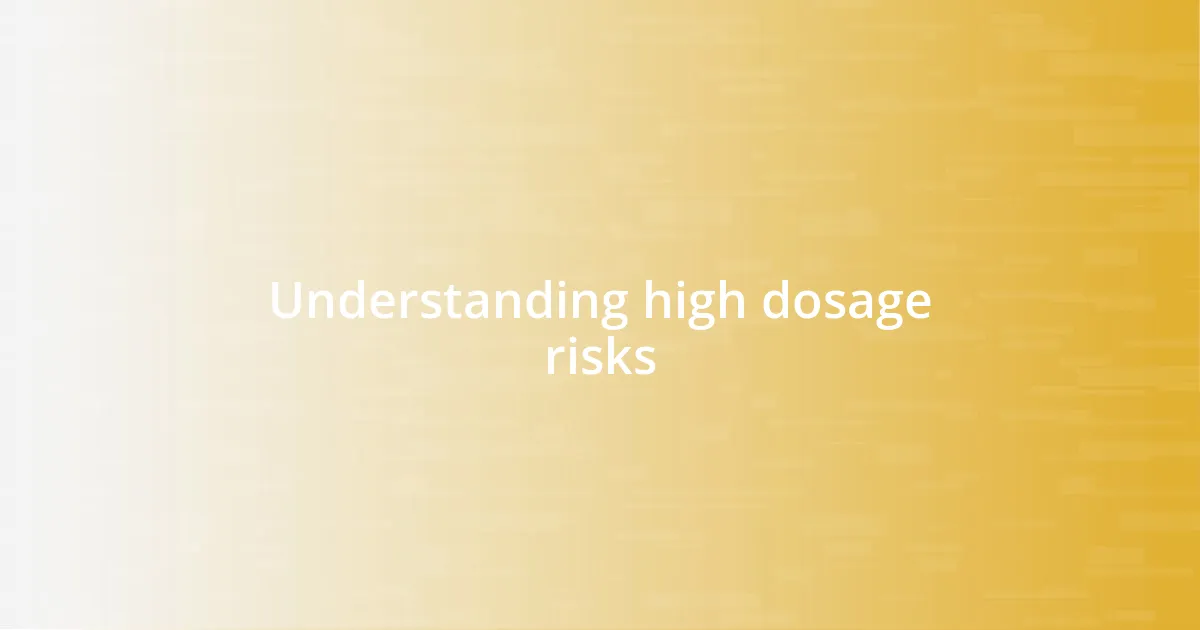
Understanding high dosage risks
Understanding high dosage risks
When I think of high dosages, the first thing that comes to mind is the fine line between transcendence and turmoil. I recall a night when I elevated my dosage significantly, seeking enlightenment. Instead, I was enveloped in confusion, feeling trapped in my own mind. It’s a stark reminder that with greater dosages comes greater unpredictability.
In my experience, the physical risks are just as alarming as the mental ones. I once experienced a notable spike in my heart rate that made me question whether I was truly safe. It was in that moment I realized how crucial it is to remain mindful. The delicate balance between exploration and safety is something I now navigate with much more caution.
Reflecting on those moments, I’ve learned to respect the power of high dosages. Each encounter taught me that what may be a thrilling adventure to some could spell disaster for others. As I strive for deeper understanding, I now view each experience through a lens of both curiosity and caution.
| Risk Type | Examples |
|---|---|
| Mental Risks | Confusion, anxiety, paranoia |
| Physical Risks | Increased heart rate, nausea, dizziness |
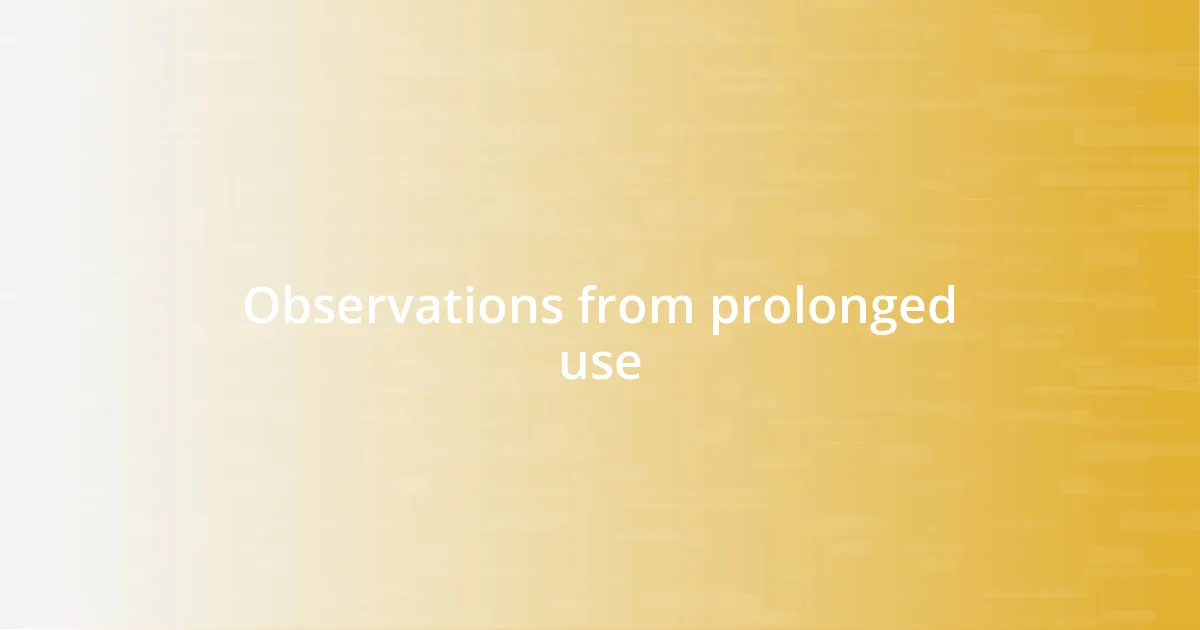
Observations from prolonged use
Observing the effects of prolonged use was both enlightening and unnerving. I remember one evening when I had been on a consistent routine of high dosages. At first, I felt that I had unlocked a new level of perception, yet as the weeks passed, I began to notice a dulling of my senses and emotions. It was as if my body had become desensitized to the very experiences I sought.
Reflecting on this phase, I can summarize my observations:
- Emotional Numbing: Initially heightened emotions began to fade, leaving a sense of apathy behind.
- Physical Fatigue: My energy levels dipped significantly, affecting my day-to-day activities.
- Cognitive Drift: I would often struggle to focus, losing sight of tasks that once held my attention.
This period serves as a crucial lesson in moderation, as I witnessed firsthand how the pursuit of more can sometimes lead to less. I’ve learned to tread carefully, reminding myself that the journey should enhance my experience rather than diminish it.
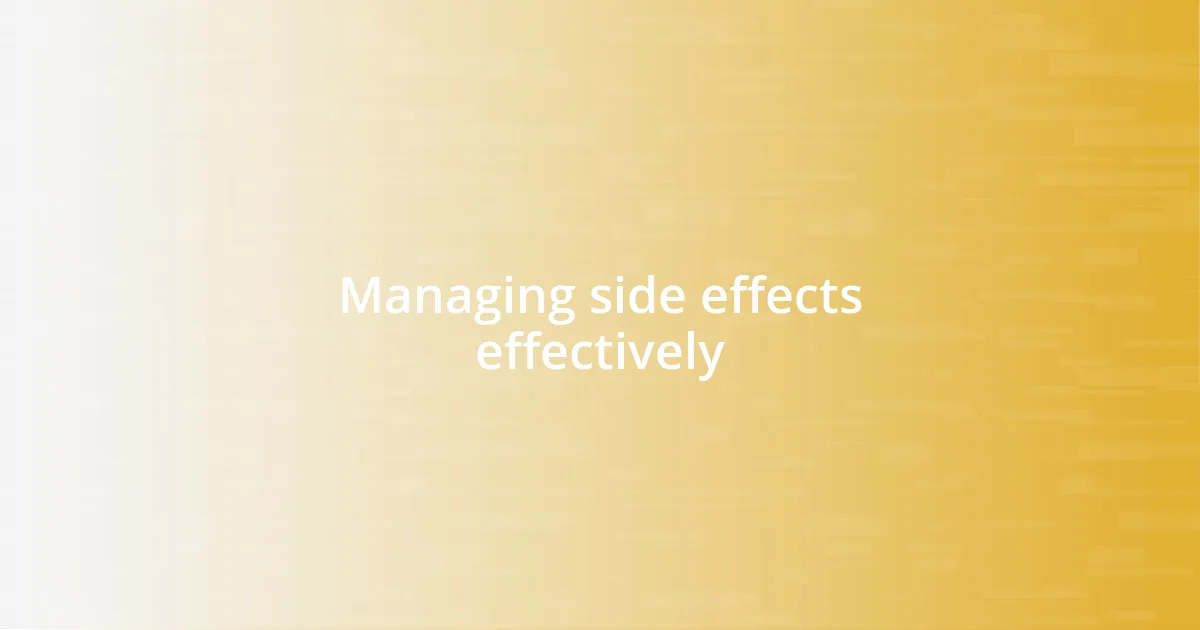
Managing side effects effectively
Managing side effects can feel like walking a tightrope, particularly when navigating the complexities of high dosages. I remember times when I felt jittery and anxious, convincing myself it was just another phase of exploration. It was only when I began incorporating breathing exercises and grounding techniques into my routine that I found my symptoms easing, transforming panic into a gentle calm. Have you ever found yourself overwhelmed? It’s amazing how simple practices can shift our mindset and physical state.
Keeping track of my health became a priority as I moved forward. I started maintaining a journal to document my experiences, noting any side effects I encountered along with their intensity. This practice not only provided clarity but also created a sense of accountability. Seeing patterns emerge in my experience helped me identify what triggered discomfort, allowing me to make informed decisions about my dosages moving forward. It’s a powerful tool—one that might offer you a similar sense of control.
Moreover, seeking support from a community has been instrumental in my journey. Sharing experiences with others who have faced similar challenges brought forth a collective wisdom I hadn’t anticipated. I recall a discussion where someone shared their go-to herbal remedies for nausea, which turned out to be incredibly effective for me too. The act of reaching out not only demystified my struggles but also made me feel less alone. Isn’t it reassuring to connect with others, especially when dealing with such delicate matters?
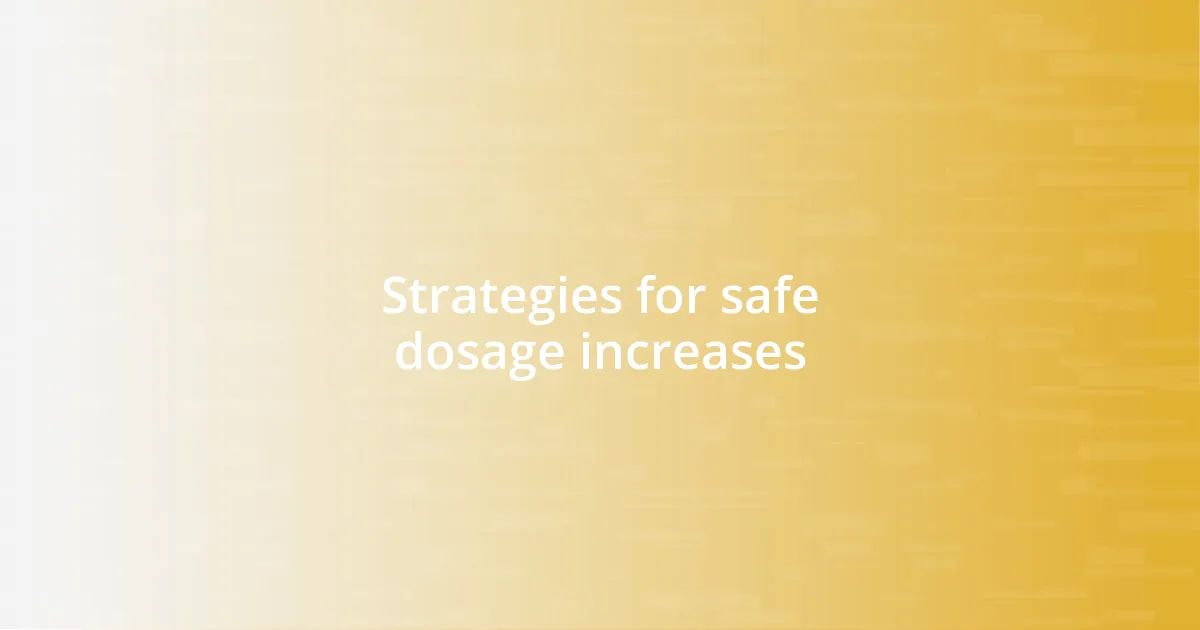
Strategies for safe dosage increases
Certainly! Here’s how I would approach discussing strategies for safe dosage increases:
One effective strategy I found was to approach dosage increases with a cautious mindset. When I felt tempted to elevate my dosage, I would pause and ask myself why I felt that way. Was it genuine necessity or mere impatience? I realized that taking small, incremental steps allowed me to gauge my body’s reactions more accurately. By increasing my dosage gradually—say by 10%—I could monitor changes without overwhelming myself too quickly.
Additionally, I learned to embrace the importance of feedback loops. After each increment, I would take a week to observe how I felt, noting down any physical or mental shifts. Journaling during this time revealed unexpected patterns; I noticed, for example, that on days I felt particularly good, maybe I didn’t need to push the dosage at all. Have you ever experienced that feeling of wanting more just because you think you should? It’s crucial to listen to our bodies—they often tell us what we need.
Lastly, I established a support system to help keep me accountable. My trusted friend, who was on a similar journey, became my sounding board. Occasionally, I’d want to increase the dosage during a particularly challenging week, and he would remind me of the progress I’d made without rushing. Having that external perspective was invaluable. I found that talking things through not only eased temptation but also reinforced my commitment to safety and mindfulness in my approach. Have you ever relied on a friend to help guide your choices? I think it’s one of the best practices we can adopt.
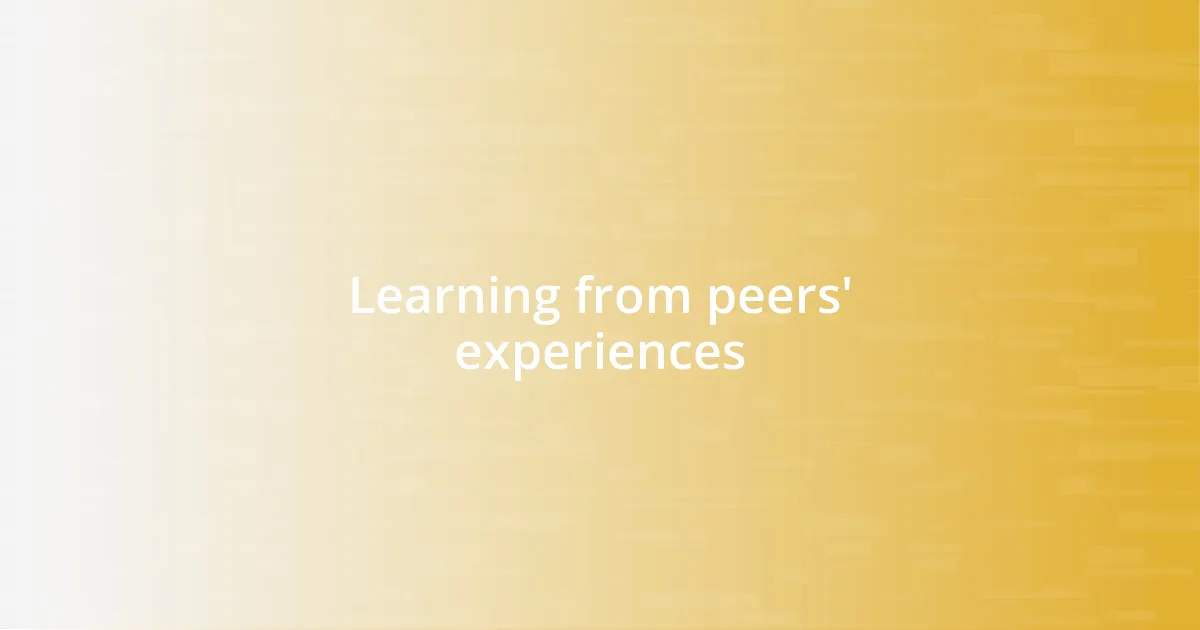
Learning from peers’ experiences
Sharing experiences with peers can be eye-opening. I remember a time when a friend told me about their struggle with high dosages. They described a moment when they felt a surge of anxiety after increasing their intake. Hearing their story made me realize I wasn’t alone in feeling this way. It sparked a discussion about coping strategies, and it’s incredible how learning from others can shift our perspective. Have you ever found solace in someone else’s story?
One thing that struck me was the importance of vulnerability. A colleague once shared their battle with nausea and how they turned to a specific herbal tea that worked wonders for them. Trying it myself not only alleviated my symptoms but also created a bond with my colleague. We often forget how powerful peer experiences can be in shaping our own practices. Isn’t it fascinating how simple remedies shared in trust can make a world of difference?
Also, peer experiences often lead to a treasure trove of tips that textbooks might overlook. In one group chat, someone suggested setting dosage reminders on our phones to avoid taking too much too soon. Implementing that small change was a game changer for me. It made me more mindful of my intake and created a routine where I felt more in control. Have you discovered any little gems of advice from those around you? It’s surprising how much wisdom exists in our circles, waiting to be shared.
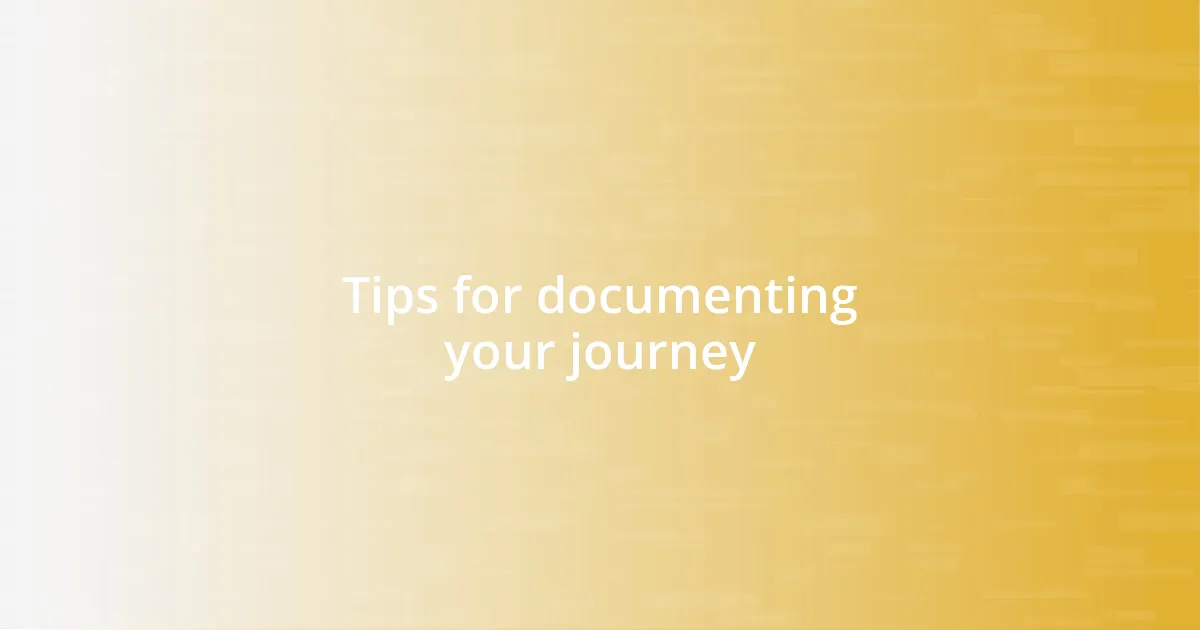
Tips for documenting your journey
Documenting your journey can be incredibly insightful and rewarding. I always found that keeping a dedicated journal was essential for tracking my experiences. After each dosage increase, I would reflect on how I felt—physically and emotionally. This practice not only provided clarity but also turned into a valuable resource for understanding my personal triggers. Have you ever thought about how writing down your thoughts could help you process your journey?
Another tip that worked for me was using digital tools. I experimented with health-tracking apps to record my dosages, symptoms, and mood changes. It became a bit of a game for me; I would input data after each dose! Seeing my patterns visually helped me connect the dots between my habits and my body’s responses. Do you think having that visual representation could make a difference in your own understanding?
Lastly, I learned the value of sharing my documentation with my support network. By discussing my notes with my friends or a supportive online community, I uncovered new insights that I might have missed. One time, a close friend pointed out a correlation between my mood dips and certain lifestyle choices I hadn’t connected before. Isn’t it fascinating how sometimes an outside perspective can shine a light on our experiences in ways we wouldn’t expect?
